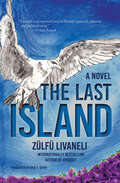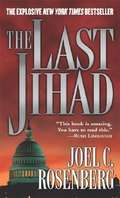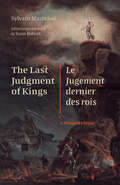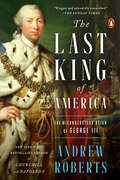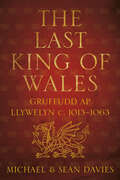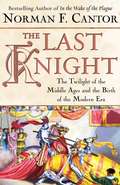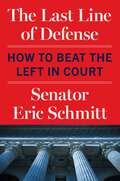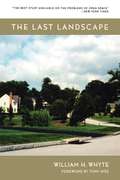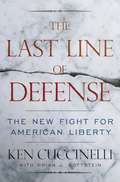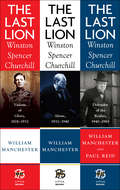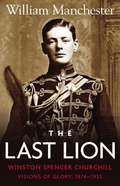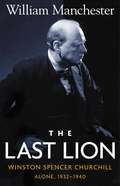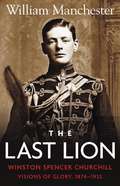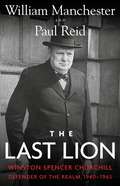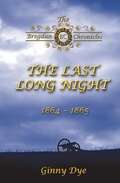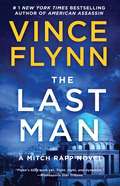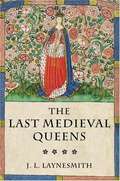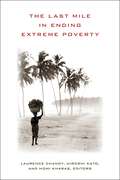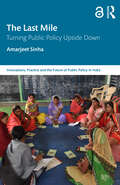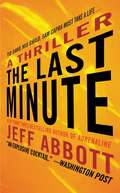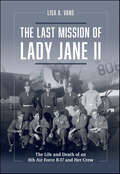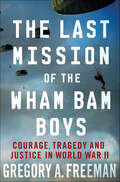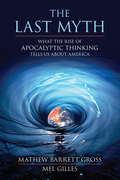- Table View
- List View
The Last Island: A Novel
by Zülfü LivaneliFrom the internationally bestselling author of Disquiet, a brilliant political allegory that vividly illustrates how capitalism and authoritarianism harm us and the environment.Having failed to hold onto power after an ironfisted first term, the former President moves to a secluded island and decides to rid it of what he sees as its &“anarchic&” components. The island, described by its close-knit community as a utopia, the last peaceful resort for humankind, morphs into dystopia when the President, in the hope of bringing order to island life, begins to act more and more like a dictator. The first ones to revolt against him are the seagulls. Originally written in 2008 as a condemnation of the authoritarian Turkish regime, The Last Island has only grown more relevant, foreshadowing the events and aftermath of Istanbul&’s bloody Gezi Park/Taksim Square political protests of 2013, as well as the protest movements of our time.
The Last Jihad (Political Thrillers #1)
by Joel C. RosenbergJon Bennett is one of the shrewdest strategists on Wall Street and a close friend of the president of the United States. His secret project: a billion-dollar oil deal off the coast of Gaza, the basis for an historic peace treaty that could bring enormous wealth to every [Israeli and Palestinian. But nothing has prepared Jon for the terror that lies ahead. The President's motorcade is attacked in Colorado. Israeli commandos foil a nuclear attack that leads them to evidence that the next |targets will be Washington, New York and Tel Aviv. And that's just the beginning. From Jerusalem, Jon Bennett and his beautiful partner, Erin McCoy, must summon all their stealth and savvy to save themselves--and the world--from absolute destruction.
The Last Judgment of Kings / Le Jugement dernier des rois: A Bilingual Edition (Scènes francophones: Studies in French and Francophone Theater)
by Sylvain Maréchal (1750-1803)First performed the day after Marie-Antoinette’s beheading, Le Jugement dernier des rois stages the burlesque trial of the remaining kings and queens of Europe—paraded in chains like animals, made to brawl over a barrel of crackers, and finally obliterated by a spectacular volcanic eruption. Such is the shocking context—at once tragic and farcical—of the most infamous play of the French Revolution, familiar to all specialists of the period. Until now, however, no standalone critical edition or English translation of this historic play existed. This bilingual edition revives Maréchal’s play and reveals its centrality to scholarly debates about Revolutionary notions of justice, religion, commemoration, comedy, and propaganda. Provocative, written in accessible prose, and short—perfect for students in a French or history seminar—Le Jugement dernier des rois offers an ideal introduction to the most important and contentious questions of the Revolutionary period. Joué pour la première fois le lendemain de l’exécution de Marie-Antoinette, Le Jugement dernier des rois met en scène le procès burlesque des autres rois et reines d’Europe : exhibés et enchaînés tels des animaux, contraints de se battre pour un tonneau de biscuits, et finalement anéantis par l’éruption spectaculaire d’un volcan. Tel est le contexte scandaleux—tragédie et farce à la fois—de la pièce la plus célèbre de la Révolution française, bien connue de tous les spécialistes de cette période. Jusqu’à maintenant, pourtant, il n’existait ni édition critique ni traduction anglaise de cet ouvrage historique. Notre édition bilingue fait revivre la pièce de Maréchal et la replace au centre des plus grands débats chez les historiens de la Révolution, traitant de justice, religion, commémoration, comédie, et propagande. Provocateur, facile à lire, et concis—parfaitement adapté aux étudiants d’un cours de français ou d’histoire—Le Jugement dernier des rois propose ainsi une introduction idéale à la période révolutionnaire et à ses principales controverses. Published by Bucknell University Press. Distributed worldwide by Rutgers University Press.
The Last King of America: The Misunderstood Reign of George III
by Andrew RobertsFrom the New York Times bestselling author of Churchill and NapoleonThe last king of America, George III, has been ridiculed as a complete disaster who frittered away the colonies and went mad in his old age. The truth is much more nuanced and fascinating--and will completely change the way readers and historians view his reign and legacy.Most Americans dismiss George III as a buffoon--a heartless and terrible monarch with few, if any, redeeming qualities. The best-known modern interpretation of him is Jonathan Groff's preening, spitting, and pompous take in Hamilton, Lin-Manuel Miranda's Broadway masterpiece. But this deeply unflattering characterization is rooted in the prejudiced and brilliantly persuasive opinions of eighteenth-century revolutionaries like Thomas Paine and Thomas Jefferson, who needed to make the king appear evil in order to achieve their own political aims. After combing through hundreds of thousands of pages of never-before-published correspondence, award-winning historian Andrew Roberts has uncovered the truth: George III was in fact a wise, humane, and even enlightened monarch who was beset by talented enemies, debilitating mental illness, incompetent ministers, and disastrous luck.In The Last King of America, Roberts paints a deft and nuanced portrait of the much-maligned monarch and outlines his accomplishments, which have been almost universally forgotten. Two hundred and forty-five years after the end of George III's American rule, it is time for Americans to look back on their last king with greater understanding: to see him as he was and to come to terms with the last time they were ruled by a monarch.
The Last King of Wales: Gruffudd ap Llywelyn, c. 1013-1063
by Michael Davies Sean DaviesGruffudd ap Llywelyn was Wales’ greatest king. Ambitious and battle-sure, he succeeded in doing what no Welsh king before him was capable of: he ruled all Wales as a united and independent state. He went further by turning the Viking threat to his realm into a powerful weapon and conquering border land that had been in English hands for centuries. Having emerged as a war leader, Gruffudd also proved to be much more: a patron of the arts and church, with the trappings of a king who was respected and feared on the European stage. His eventual murder at the hands of his own men narrowed the country’s political ambitions and left Wales in chaos on the eve of the arrival of the Normans. Those who betrayed Gruffudd were the forebears of the famous princes who would dominate Wales until the Edwardian Conquest, meaning that the former king left no one to tell of his glory. As a result, 1,000 years after his birth, the would-be nation builder is all but forgotten. Here, Sean and Michael Davies reveal the king in all his glory, telling for the first time the story of one of Wales’ greatest figures and exploring the full implications of Gruffudd’s rule. For, without Gruffudd, the fate of King Harold and the outcome of the Battle of Hastings would have been very different…
The Last Knight: The Twilight of the Middle Ages and the Birth of the Modern Era
by Norman F. CantorThere may not be a more fascinating a historical period than the late fourteenth century in Europe. The Hundred Years' War ravaged the continent, yet gallantry, chivalry, and literary brilliance flourished in the courts of England and elsewhere. It was a world in transition, soon to be replaced by the Renaissance and the Age of Exploration -- and John of Gaunt was its central figure. In today's terms, John of Gaunt was a multibillionaire with a brand name equal to Rockefeller. He fought in the Hundred Years' War, sponsored Chaucer and proto-Protestant religious thinkers, and survived the dramatic Peasants' Revolt, during which his sumptuous London residence was burned to the ground. As head of the Lancastrian branch of the Plantagenet family, Gaunt was the unknowing father of the War of the Roses; after his death, his son usurped the crown from his nephew, Richard II. Gaunt's adventures represent the culture and mores of the Middle Ages as those of few others do, and his death is portrayed in The Last Knight as the end of that enthralling period.
The Last LIne of Defense: How to Beat the Left in Court
by Eric SchmittOne of the Senate's leading conservatives reveals the key approaches needed for the Right to triumph over liberal lawyers and out-of-control judges.When Joe Biden took office, Eric Schmitt had been attorney general for just over two years and had been focused on tackling violent crime. As soon as he began to see the outrageous excesses of the Biden Administration, he and his team snapped into action, waging war on the Biden regimes' stunning attempts at government overreach, winning some of the most important fights in modern American history, helping set the stage for a return to commonsense in government.Now, in The Last Line of Defense, Senator Schmitt takes readers behind the scenes of those battles for the first time, talks about the lessons learned, and how conservatives can keep winning in court and beyond. He takes you inside some of his biggest wins against:· Mask mandates and vaccine mandates· Student debt forgiveness· Restrictions on Second Amendment rights· Soros-backed prosecutors· Woke ideology in our schools· Open borders· Attacks on free speech· The weaponization of government agencies With President Trump back in office and the Left fighting him at every turn, it's more important than ever to remember just how close we came to losing it all — and why we need to keep playing to win.
The Last Landscape
by William H. Whyte Tony HissThe remaining corner of an old farm, unclaimed by developers. The brook squeezed between housing plans. Abandoned railroad lines. The stand of woods along an expanded highway. These are the outposts of what was once a larger pattern of forests and farms, the "last landscape." According to William H. Whyte, the place to work out the problems of our metropolitan areas is within those areas, not outside them. The age of unchecked expansion without consequence is over, but where there is waste and neglect there is opportunity. Our cities and suburbs are not jammed; they just look that way. There are in fact plenty of ways to use this existing space to the benefit of the community, and The Last Landscape provides a practical and timeless framework for making informed decisions about its use. Called "the best study available on the problems of open space" by the New York Times when it first appeared in 1968, The Last Landscape introduced many cornerstone ideas for land conservation, urging all of us to make better use of the land that has survived amid suburban sprawl. Whyte's pioneering work on easements led to the passage of major open space statutes in many states, and his argument for using and linking green spaces, however small the areas may be, is a recommendation that has more currency today than ever before.
The Last Line of Defense: The New Fight for American Liberty
by Ken CuccinelliVirginia Attorney General Ken Cuccinelli leads the historic fight against the unprecedented overreach of the federal government. With Obamacare and agencies like the EPA, the FCC, and the National Labor Relations Board attempting to exercise unprecedented control over the American people, the Obama Administration was breaking federal laws, ignoring federal courts, and violating the Constitution to achieve its goals of redistributing wealth, concentrating power in Washington, and rewarding its supporters. Without enough lawmakers in Washington devoted to protecting the rule of law to stop the federal government's liberty-stealing power grab, the battle had to be waged in an unprecedented way: from the states -- just as our Founding Fathers intended. The man who led the charge was Ken Cuccinelli, the first state attorney general to argue in federal court against Obamacare, an unapologetic defender of the Constitution, and a man admirers and detractors alike said "was tea party long before there was a Tea Party." The Last Line of Defense provides a behind-the-scenes account of the myriad of legal battles in which our states were the only instruments of resistance to federal abuses of power. It is a must-read for every patriot.
The Last Lion Box Set: Winston Spencer Churchill, 1874 - 1965
by William Manchester Paul ReidSpanning the years of 1940-1965, THE LAST LION picks up shortly after Winston Churchill became Prime Minister-when his tiny island nation stood alone against the overwhelming might of Nazi Germany. The Churchill conjured up by William Manchester and Paul Reid is a man of indomitable courage, lightning fast intellect, and an irresistible will to action. THE LAST LION brilliantly recounts how Churchill organized his nation's military response and defense; compelled FDR into supporting America's beleaguered cousins, and personified the "never surrender" ethos that helped the Allies win the war, while at the same time adapting himself and his country to the inevitable shift of world power from the British Empire to the United States. More than twenty years in the making, THE LAST LION presents a revelatory and unparalleled portrait of this brilliant, flawed, and dynamic leader. This is popular history at its most stirring.ST LION is the definitive work on this remarkable man whose courageous vision guided the destiny of a nation during darkly troubled times-and who looms as one of the greatest figures of our century.
The Last Lion: Alone, 1932-1940
by William R. ManchesterThe second volume of this thorough Churchill biography.
The Last Lion: Visions of Glory, 1874-1932
by William R. ManchesterEarly life of Winston Churchill.
The Last Lion: Volume 1
by William ManchesterWilliam Manchester met Winston Churchill on January 24, 1953. Their encounter on the Queen Mary sparked an intense curiosity in Manchester that would eventually result in his classic three-volume magnum opus The Last Lion. In this, the first volume, we follow Churchill from his birth to 1932, when he began to warn against the remilitarization of Germany. Born of a lovely, wanton American mother and a gifted but unstable son of a duke, his childhood was one of wretched neglect. He sought glory on the battlefields of Cuba, Sudan, India, South Africa and the trenches of France. In Parliament he was the prime force behind the creation of Iraq and Jordan, laid the groundwork for the birth of Israel, and negotiated the independence of the Irish Free State. Yet, as Chancellor of the Exchequer he plunged England into economic crisis, and his fruitless attempt to suppress Gandhi's quest for Indian independence brought political chaos to Britain.Throughout, Churchill learned the lessons that would prepare him for the storm to come, and as the 1930's began, he readied himself for the coming battle against Nazism--an evil the world had never before seen.
The Last Lion: Winston Churchill: Visions of Glory, 1874 - 1932
by William ManchesterWilliam Manchester met Winston Churchill on January 24, 1953. Their encounter on the Queen Mary sparked an intense curiosity in Manchester that would eventually result in his classic three-volume magnum opus The Last Lion. In this, the first volume, we follow Churchill from his birth to 1932, when he began to warn against the remilitarization of Germany. Born of a lovely, wanton American mother and a gifted but unstable son of a duke, his childhood was one of wretched neglect. He sought glory on the battlefields of Cuba, Sudan, India, South Africa and the trenches of France. In Parliament he was the prime force behind the creation of Iraq and Jordan, laid the groundwork for the birth of Israel, and negotiated the independence of the Irish Free State. Yet, as Chancellor of the Exchequer he plunged England into economic crisis, and his fruitless attempt to suppress Gandhi's quest for Indian independence brought political chaos to Britain.Throughout, Churchill learned the lessons that would prepare him for the storm to come, and as the 1930's began, he readied himself for the coming battle against Nazism--an evil the world had never before seen.
The Last Lion: Winston Spencer Churchill: Defender of the Realm, 1940-1965 (The\last Lion Ser. #3)
by William Manchester Paul ReidSpanning the years of 1940-1965, THE LAST LION picks up shortly after Winston Churchill became Prime Minister-when his tiny island nation stood alone against the overwhelming might of Nazi Germany. The Churchill conjured up by William Manchester and Paul Reid is a man of indomitable courage, lightning fast intellect, and an irresistible will to action. THE LAST LION brilliantly recounts how Churchill organized his nation's military response and defense; compelled FDR into supporting America's beleaguered cousins, and personified the "never surrender" ethos that helped the Allies win the war, while at the same time adapting himself and his country to the inevitable shift of world power from the British Empire to the United States. More than twenty years in the making, THE LAST LION presents a revelatory and unparalleled portrait of this brilliant, flawed, and dynamic leader. This is popular history at its most stirring.
The Last Long Night (The Bregdan Chronicles #5)
by Ginny DyeCan they survive the Last, Long Night of the Civil War? The power of the Union army brings the South to its knees in surrender, but not until a year of intense pain and violence creates a chasm that may be impossible for the country to bridge. Carrie struggles to hold on to hope as the world caves in around her, hanging on to the promise she’s been given. She also finally gets to reveal the secret she has held so close. Moses is gravely wounded in battle. Aunt Abby faces danger as she gets more deeply involved with women’s rights, and spends time in Washington, D.C. Robert’s plantation takes a severe loss, but is saved from burning by an unlikely source. Rose continues to thrive in the Contraband Camp and finally has a dream come true.
The Last Man: A Novel (A Mitch Rapp Novel #13)
by Vince Flynn#1 New York Times bestselling author Vince Flynn &“has never been better&” (The Providence Journal) in this high-octane thriller following Mitch Rapp as he searches for a missing CIA asset, whose disappearance puts Rapp&’s own life at risk.Joe Rickman has spent the last eight years running the CIA&’s clandestine operations in Afghanistan, working with every disreputable figure in the Islamic Republic. When he suddenly goes missing, the initial assumption is kidnapping, but Mitch Rapp knows certain things about his old friend that gives him pause. When he&’s ordered to find Rickman, no matter the cost, Rapp knows his mission will be an exceptionally dangerous one. With the Taliban, Iran, Pakistan, and Russia all vying for a piece of the war-torn state and the FBI dispatching their own special agent to investigate, Rapp is facing his most difficult assignment yet. With white-knuckled twists and turns, The Last Man proves once again that Vince Flynn &“is a master—maybe the master—of thrillers in which the pages seem to turn themselves&” (Book Reporter).
The Last Medieval Queens: English Queenship 1445-1503
by J. L. LaynesmithAuthor tells about the importance of the nature and role of queen ship in the last years of medieval England. What sort of woman was chosen to be queen? What behaviour was expected of her? What power or authority was granted to her? How did the king use her in the exercise of his kingship?
The Last Mile in Ending Extreme Poverty
by Homi Kharas Laurence Chandy Hiroshi KatoThe past quarter century has witnessed a stunning reduction in the number of people around the world living on less than $1.25 a day, the marker for extreme poverty. This has led to a new sense of hope that extreme poverty can be eradicated within a generation. Yet optimism is tempered by the unique circumstances facing those who remain left behind and new challenges that weaken traditional paths to prosperity. The Last Mile in Ending Extreme Poverty explores what it will take to finish the course. It identifies three critical challenges that define the last mile: securing peace, creating jobs, and strengthening resilience. These are issues that development experts have largely overlooked, on which cutting-edge knowledge is blunt and best-practice solutions feel decidedly underwhelming.By uncovering evidence and approaches to address these issues--and while pointing out the knowledge gaps that remain--The Last Mile outlines an agenda to inform development research and poverty reduction strategies for governments, international organizations, donors, charities, and foundations around the world.Contributors: Michael Carnahan (Department of Foreign Affairs and Trade, Government of Australia), Raj M. Desai (Georgetown University and Brookings), Shane Evans (Department of Foreign Affairs and Trade, Government of Australia), Akio Hosono (JICA), Bruce Jones (Brookings), Marcus Manuel (Overseas Development Institute), John McArthur (Brookings and UN Foundation), Alastair McKechnie (Overseas Development Institute and University of Otago), Gary Milante (Stockholm International Peace Research Institute), Yoichi Mine (JICA and Doshisha University), Ryutaro Murotani (JICA), John Page (Brookings), Go Shimada (University of Shizuoka, JICA, Columbia University, and Waseda University), Stephen C. Smith (George Washington University and Brookings)er disasters, Go Shimada, JICA-RI Social protection and the end of extreme poverty, Raj Desai, Georgetown University and Brookings
The Last Mile in Ending Extreme Poverty
by Homi Kharas Laurence Chandy Hiroshi KatoViewed from a global scale, steady progress has been made in reducing extreme poverty-defined by the $1.25-a-day poverty line-over the past three decades. This success has sparked renewed enthusiasm about the possibility of eradicating extreme poverty within a generation. However, progress is expected to become more difficult, and slower, over time. This book will examine three central changes that need to be overcome in traveling the last mile: breaking cycles of conflict, supporting inclusive growth, and managing shocks and risks. By uncovering new evidence and identifying new ideas and solutions for spurring peace, jobs, and resilience in poor countries, The Last Mile in Ending Extreme Poverty will outline an agenda to inform poverty reduction strategies for governments, donors, charities, and foundations around the world.ContentsPart I: Peace: Breaking the Cycle of Conflict External finance for state and peace building, Marcus Manuel and Alistair McKechnie, Overseas Development Institute Reforming international cooperation to improve the sustainability of peace, Bruce Jones, Brookings and New York University Bridging state and local communities through livelihood improvements, Ryutaro Murotani, JICA, and Yoichi Mine, JICA-RI and Doshisha University Postconflict trajectories and the potential for poverty reduction, Gary Milante, SIPRIPart II: Jobs: Supporting Inclusive Growth Structural change and Africa's poverty puzzle, John Page, Brookings Public goods for private jobs: lessons from the Pacific, Shane Evans, Michael Carnahan and Alice Steele, Department of Foreign Affairs and Trade, Government of Australia Strategies for inclusive development in agrarian Sub-Saharan countries, Akio Hosono, JICA-RI The role of agriculture in poverty reduction, John McArthur, Brookings, UN Foundation, and Fung Global InstitutePart III: Resilience: Managing Shocks and Risks Environmental stress and conflict, Stephen Smith, George Washington University and Brookings Toward community resilience: The role of social capital after disasters, Go Shimada, JICA-RI Social protection and the end of extreme poverty, Raj Desai, Georgetown University and Brookings
The Last Mile: Turning Public Policy Upside Down (Innovations, Practice and the Future of Public Policy in India)
by Amarjeet SinhaThe Last Mile explores the gaps and dichotomy between drafted policies and their implementation, and the last mile challenges which often make public services inaccessible to the poorest and most vulnerable sections of society. It provides an in-depth overview of the dynamics between communities, research and consultation and the implementation of policies for development. Rich in empirical data and case studies from different government programmes and reports, this book examines the implementation of government service programmes for poverty reduction, women’s empowerment, and income generation for the poor, among others, from a people’s perspective. It highlights the need for policies and institutions to align their methods to community needs. Offering guidelines for redesigning as well as solutions to counter challenges related to lack of trust and effective communication, human resource management, capacity development, redressal mechanisms, and facilitating the last mile connection, the author delineates effective ways for integrating new technologies in policy implementation. The book also addresses legacy issues in institutions and re-orienting policy for better governance, transparency, and building trust. Part of the Innovations, Practice and the Future of Public Policy in India series, this book, by a senior practitioner, will be an essential resource for students and researchers of development studies, sociology, public policy and governance, economics, and South Asian studies. This book is freely available as a downloadable Open Access PDF at http://www.taylorfrancis.com under a Creative Commons (CC-BY-NC-ND) 4.0 license.
The Last Minute (The Sam Capra Series #2)
by Jeff AbbottSam Capra must commit an impossible assassination--or he will lose the only person in the world who matters to him . . . Sam Capra has one reason to live: to rescue his baby son from the people who abducted him. An ex-CIA agent, Sam now owns bars around the world as cover for his real mission-working undercover for a secret network as mysterious as it is powerful, while using his skills to find his child. Now the kidnappers have offered a deadly deal: they'll surrender Sam's child...if Sam finds and murders the one man who can expose them. Teaming up with a desperate young mother whose daughter is also missing, Sam tracks his prey-and his son-across the country in a dangerous race against time, and must unravel a deadly conspiracy if he's to rescue the only person in the world that matters to him.
The Last Mission of Lady Jane II: The Life and Death of an 8th Air Force B-17 and Her Crew
by Lisa A. VansFurther insight into the experience for 8th Air Force bomber crews over Germany, and in German captivity. New revelations about the investigation of the murder of several American bomber crewmen by German civilians. Learn personal stories about the crewmen of Lady Jane II, including the postwar struggles of the survivors.
The Last Mission of the Wham Bam Boys: Courage, Tragedy and Justice in World War II
by Gregory A. FreemanBefore the famed Nuremberg Tribunal, there was Rüsselsheim, a small German town, where ordinary civilians were tried in the first War Crimes Trial of World War II.As the tide of World War II turned, a hitherto unknown incident set a precedent for how we would bring wartime crimes to justice: In August 1944, the 9- man crew of an American bomber was forced to bail out over Germany. As their captors marched them into Rüsselsheim, a small town recently bombed to smithereens by Allies, they were attacked by an angry mob of civilians--farmers, shopkeepers, railroad workers, women, and children. With a local Nazi chief at the helm, they assaulted the young Americans with stones, bricks, and wooden clubs. They beat them viciously and left them for dead at the nearby cemetery.It could have been another forgotten tragedy of the war. But when the lynching was briefly mentioned in a London paper a few months later, it caught the eye of two Army majors, Luke Rogers and Leon Jaworski. Their investigation uncovered the real human cost of the war: the parents and a newlywed wife who agonized over the fate of the men, and the devastating effect of modern warfare on civilian populations. Rogers and Jaworski put the city of Rüsselsheim on trial, insisting on the rule of law even amidst the horrors of war. Drawing from trial records, government archives, interviews with family members, and personal letters, highly-acclaimed military historian Gregory A. Freeman brings to life for the first time the dramatic story. Taking the reader to the scene of the crime and into the homes of the crew, he exposes the stark realities of war to show how ordinary citizens could be drawn to commit horrific acts of wartime atrocities, and the far-reaching effects on generations.
The Last Myth
by Matthew Barrett GrossDuring the first dozen years of the twenty-first century, apocalyptic anticipation in America has leapt from the cultish to the mainstream. Today, nearly 60 percent of Americans believe that the events foretold in the book of Revelation will come true. But many secular readers also seem hungry for catastrophe and have propelled books about peak oil, global warming, and the end of civilization into bestsellers. How did we come to live in a culture obsessed by the belief that the end is near? The Last Myth explains why apocalyptic beliefs are surging within the American mainstream today. Demonstrating that our expectation of the end of the world is a surprisingly recent development in human thought, the book reveals the profound influence of apocalyptic thinking on America's past, present, and future.
